Multidisciplinary specialists, social workers and palliative care providers are valuable contributors
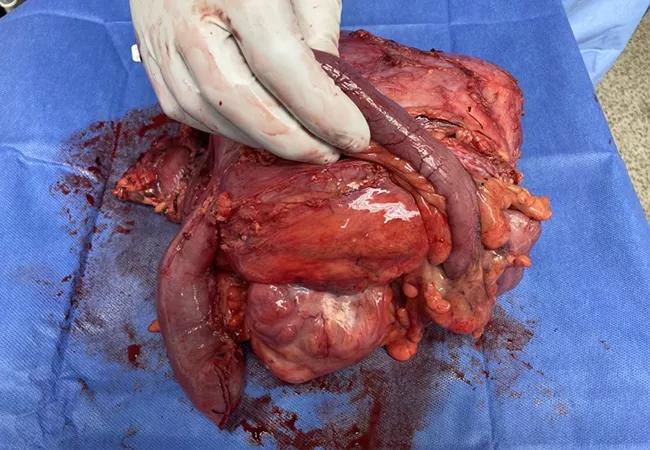
Given the rare nature of sarcomas, particularly those in the retroperitoneum, a high level of expertise from a multidisciplinary team is needed for disease management. Since these cancers can be aggressive locally, prompt and accurate treatment is crucial.
Advertisement
Cleveland Clinic is a non-profit academic medical center. Advertising on our site helps support our mission. We do not endorse non-Cleveland Clinic products or services. Policy
“Unlike many other cancers, sarcoma can occur anywhere in your body,” says Nathan Mesko, MD, Center Director, Orthopaedic Oncology, and Director of Sarcoma Care at Cleveland Clinic. “Because of this, it is important to have a team of ultra-specialized clinicians involved in these cases to ensure the best possible outcomes for patients.”
Cleveland Clinic’s comprehensive Sarcoma Program, for example, streamlines care across disciplines. The program includes medical oncologists, radiation oncologists, orthopaedic surgeons, other surgical subspecialists, pathologists, radiologists, palliative medicine specialists, psychosocial oncologists and other practitioners.
The Sarcoma Tumor Board meets weekly and involves all core disciplines that have the opportunity to submit cases and contribute expertise when determining the course of treatment for patients.
The value of this multidisciplinary team is illustrated by a recent case involving a man in his 60s, who was referred to Cleveland Clinic’s Sarcoma Center by a colorectal surgeon at another medical center.
Cleveland Clinic’s team initiated preoperative radiation therapy, registering the patient for an ongoing study exploring short-course radiation for retroperitoneal sarcoma. When radiation therapy was completed, the patient was prepared for surgical resection of the tumor by surgical oncologist Daniel Joyce, MBBCh.
Dr. Joyce and his colleagues knew that the patient’s right kidney and colon would need to be removed, but they also prepared for the possibility of a Whipple procedure.
Advertisement
“This is not a procedure that is commonly done for sarcoma, but in this case it was necessary,” explains Dr. Joyce. “We were prepared with the team and resources to successfully execute this complex operation.”
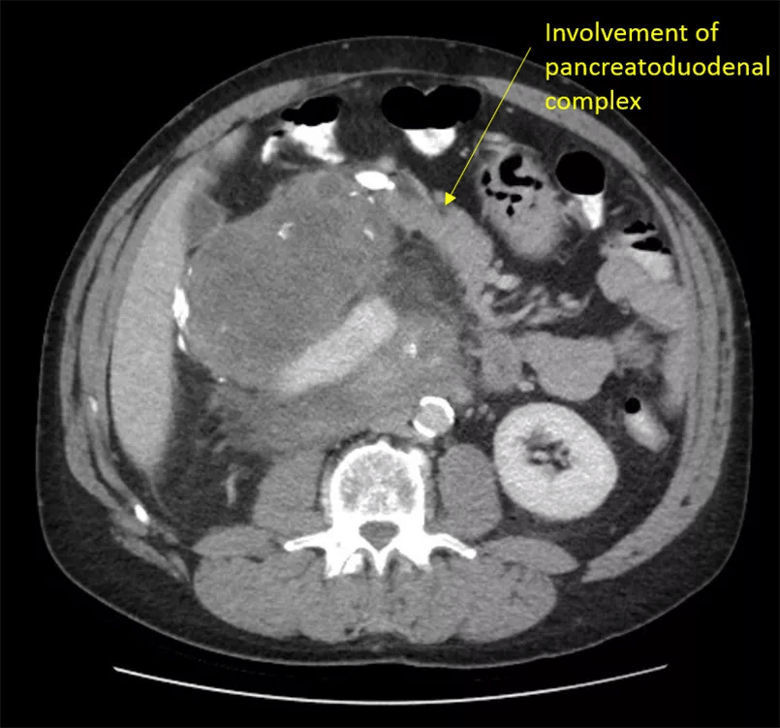
Image content: This image is available to view online.
View image online (https://assets.clevelandclinic.org/transform/8abc4253-98af-4dc8-a7cb-cb2dcb615057/21-ORI-2348982-Inset-1_png)
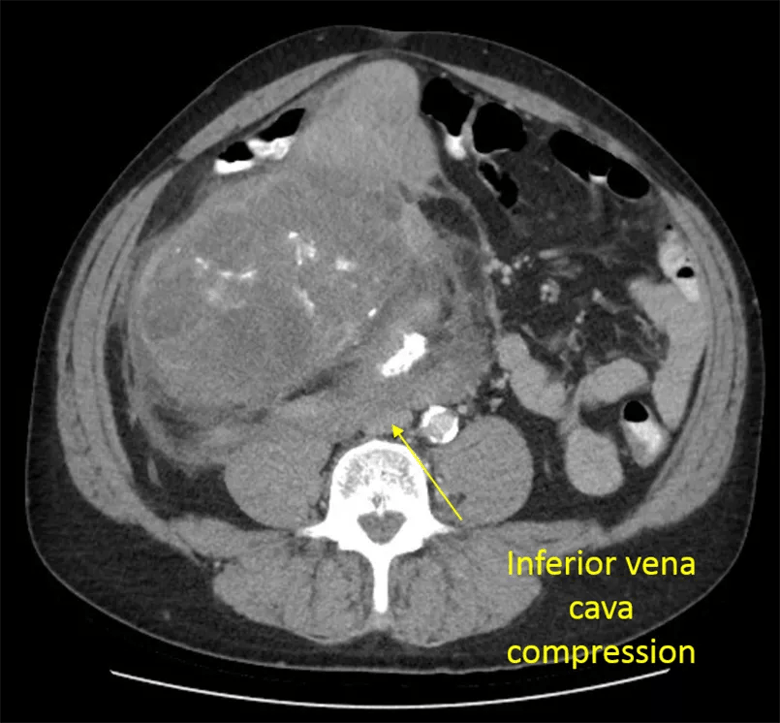
Image content: This image is available to view online.
View image online (https://assets.clevelandclinic.org/transform/b959dd51-58bd-4465-82ae-efddfcb9d094/21-ORI-2348982-Inset-2-1_png)
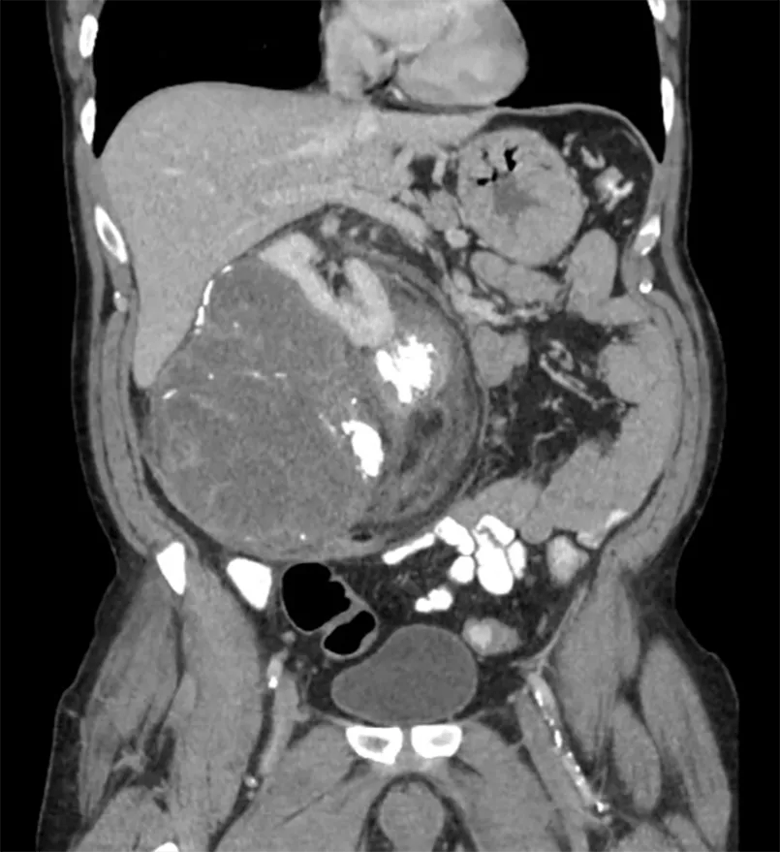
Image content: This image is available to view online.
View image online (https://assets.clevelandclinic.org/transform/3130e93e-fe34-4855-adb6-cbd33db2ca68/21-ORI-2348982-Inset-3_png)
Preoperative CT scan images demonstrate the extent of tumor involving the right kidney, right colon and pancreatoduodenal complex.
There also had been concerns that the patient’s inferior vena cava was involved. Preparing for every possible scenario, Dr. Joyce’s team ensured vascular surgeons were ready to step in if necessary.
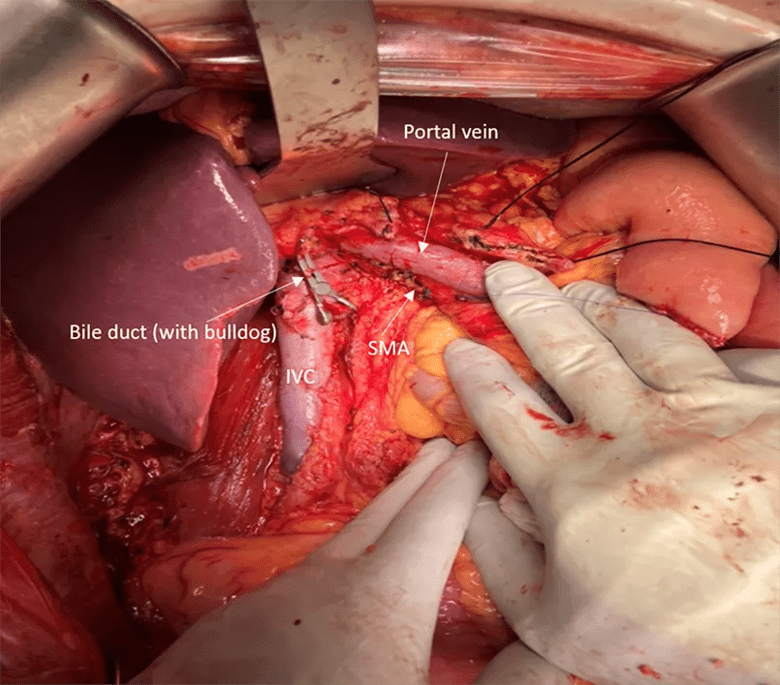
Image content: This image is available to view online.
View image online (https://assets.clevelandclinic.org/transform/7bdaf079-c486-4bad-b2a5-87096c0220ff/21-ORI-2348982-Inset-4_png)
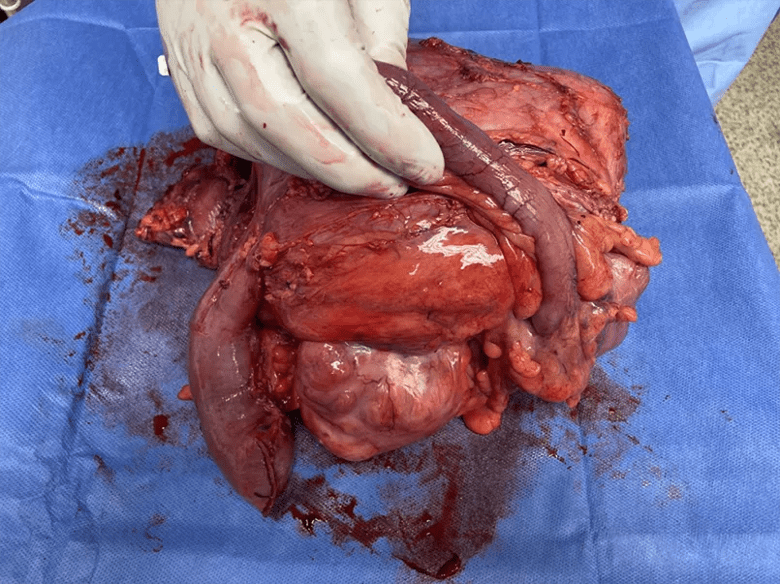
Image content: This image is available to view online.
View image online (https://assets.clevelandclinic.org/transform/9653b785-f76b-4ca9-bfb4-c93beb669d8b/21-ORI-2348982-Inset-5_png)
Post-resection pictures demonstrate complete macroscopic resection of the tumor.
“In many of these cases, we have several different teams prepared and on standby,” says Dr. Joyce. “We tend to go to the operating room with plans A to Z, hoping never to get to Z. But sometimes it takes plan B or plan C to do what’s best for the patient. The most important decisions are made before entering the operating room. Once in surgery, we simply execute those decisions.”
With retroperitoneal sarcomas, the first opportunity for resection has the greatest likelihood of success, according to Dr. Joyce. This is why it is vital that the initial operation is planned and executed well.
The patient in this case is now more than six weeks post-surgery, and Dr. Joyce continues follow-up care.
“The patient has had no postoperative complications,” he reports. “He’s eating normally, and his pain has improved. We will continue to follow him for potential recurrence — which is not trivial with these tumors — but he is doing well, and the outcome is promising.”
Advertisement
The multidisciplinary team extends well beyond the operating room to ensure every aspect of a patient’s care is addressed appropriately.
“We approach the patient as a whole,” says Dr. Joyce, highlighting the important role the social work team played in his recent retroperitoneal sarcoma case. The patient’s 96-year-old father was his power of attorney, so given the potential complications of surgery, the social work team helped plan for all possible scenarios.
Another key discipline is palliative care. At Cleveland Clinic, the palliative care team is involved early in the process to help address any cancer- or treatment-related symptoms a patient may face.
“The palliative medicine group plays a critical role in the treatment plan, helping manage symptoms and optimizing the patient’s quality of life from day to day,” says Dr. Joyce.
Retroperitoneal sarcoma poses a challenge for both patients and the practitioners who care for them. As such, a robust, multidisciplinary team supports positive outcomes not only through active treatment, but also during follow-up care.
“No matter how successful the treatment, these patients require close monitoring by a multidisciplinary team over the long term,” says Dr. Mesko. “Unlike with other diseases, care for retroperitoneal sarcoma often becomes a lifelong relationship.”
Advertisement
Advertisement

Radiation therapy helped shrink hand nodules and improve functionality

Standard of care is linked to better outcomes, but disease recurrence and other risk factors often drive alternative approaches

Phase 1 study demonstrates immune response in three quarters of patients with triple-negative breast cancer

Multidisciplinary teams bring pathological and clinical expertise

Genetic variants exist irrespective of family history or other contributing factors

Study shows significantly reduced risk of mortality and disease complications in patients receiving GLP-1 agonists

Structured interventions enhance sleep, safety and caregiver resiliency in high-acuity units

Addressing rare disease and challenging treatment course in an active young patient